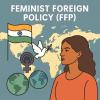Biological Disasters, Climate Extremes, and India’s Air Power–Driven Humanitarian Outreach
India’s recent humanitarian intervention in Sri Lanka following Cyclone Ditwah once again underlined the growing centrality of the Indian Air Force (IAF) in regional disaster response. In November 2024, the IAF deployed IL-76 and C-130J transport aircraft to evacuate 335 stranded Indian nationals from Colombo while simultaneously delivering emergency relief supplies.







